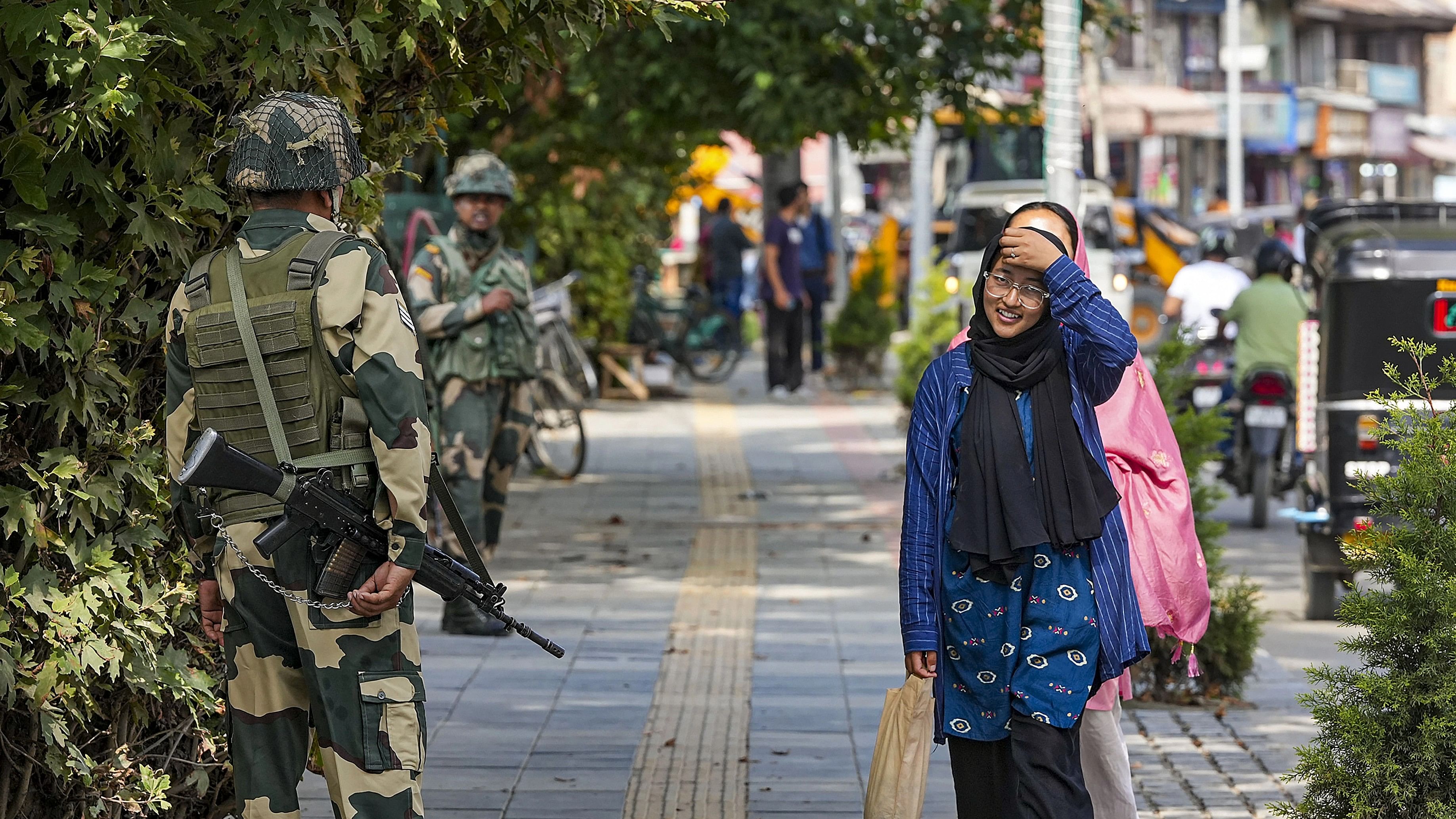
Srinagar: BSF personnel stand guard on a street, a day before the fourth anniversary of the abrogation of Article 370 of the Constitution, in Srinagar, Friday, Aug. 4, 2023.
Credit: PTI Photo
The Supreme Court is scheduled to pronounce its verdict on Monday (December 11) on a batch of petitions challenging the abrogation of the provisions of Article 370.
According to the cause list for December 11 (Monday), uploaded on the apex court's website, a five-judge Constitution bench headed by Chief Justice D Y Chandrachud will be delivering the verdict.
The other members of the bench are Justices Sanjay Kishan Kaul, Sanjiv Khanna, B R Gavai and Surya Kant. The apex court reserved its verdict in the matter on September 5 after a 16-day hearing.
What is Article 370?
The 'temporary' provision of Article 370 in the Indian Constitution had given the former state of Jammu and Kashmir a special status, allowing it to have its own constitution, a separate flag, and limited interference by the Indian government.
Hence, Article 370 would compel the Union government to take approval from the state government to apply laws in Jammu and Kashmir, except for those related to defence, foreign affairs, finance, and communications. Citizens of J&K, under the said Article, used to have separate set of laws regarding citizenship, property ownership and fundamental rights.
One of the key aspects of this law concerning the citizens was that no citizen from other states could buy land or property in J&K. Also, this Article barred the central government from declaring emergency in the state on grounds of internal unrest without the concurrence of the state government.
When did it come into being?
Article 370 was drafted in 1947 by Sheikh Abdullah, who was appointed as the Prime Minister of Jammu and Kashmir by Maharaja Hari Singh and Jawahar Lal Nehru. Abdullah's talks with the Indian Constituent Assembly finally led to the adoption of Article 370 in 1949.
Abrogation of Article 370
The Narendra Modi-led BJP government, in August 2019, scrapped Article 370 in J&K, shaking the entire political arena. The Centre had also bifurcated Jammu and Kashmir into the Union Territory of Ladakh and the Union Territory of J&K.
Argument against scrapping of Article 370
Some of the petitioners opposing the repeal of Article 370 had argued that the provision could not have been abrogated as the term of the Jammu and Kashmir constituent Assembly ended in 1957 after it drafted the erstwhile state's Constitution. With the constituent Assembly having become extinct, Article 370 acquired a permanent status, they had said.
Critics of the scrapping of Article 370 were of the opinion that the move would drastically impact the region's autonomy and demographic composition.
Centre's defence in abrogating Article 370
The Centre had argued that there was no "constitutional fraud" in annulling the provision that accorded the special status to the erstwhile state of Jammu and Kashmir. It had also stated that the said law was hindering the development of the region. The Union government had defended itself by citing the reduction in militancy, stone-pelting incidents and casualties among the security personnel after the abrogation of Article 370.
What happened in the apex court
During the hearing, the top court heard Attorney General R Venkataramani, Solicitor General Tushar Mehta, senior advocates Harish Salve, Rakesh Dwivedi, V Giri, and others on behalf of the Centre and the intervenors defending the abrogation of the provisions of Article 370.
Senior advocates, including Kapil Sibal, Gopal Subramanium, Rajeev Dhavan, Zaffar Shah and Dushyant Dave, had argued on behalf of the petitioners.
The lawyers had dwelt on various issues, including the constitutional validity of the Centre's decision to abrogate the provisions of Article 370, the validity of the Jammu and Kashmir Reorganisation Act which split the erstwhile state into two Union territories, challenges to the imposition of the governor's rule in Jammu and Kashmir on June 20, 2018, and the imposition of the president's rule on December 19, 2018 and its extension on July 3, 2019.
The petitions challenging the abrogation of the provisions of Article 370 and the validity of the Jammu and Kashmir Reorganisation Act, 2019 that divided the erstwhile state into the Union territories of Jammu and Kashmir and Ladakh were referred to the Constitution bench in 2019.
The arguments in the matter had commenced on August 2.
During the hearing, the apex court had asked who can recommend the revocation of Article 370 in Jammu and Kashmir when no constituent Assembly, the concurrence of which is required before taking such a step, exists there.
The top court had also asked how can a provision (Article 370), which was specifically mentioned as temporary in the Constitution, become permanent after the tenure of the Jammu and Kashmir constituent Assembly came to an end in 1957.
(With PTI inputs)